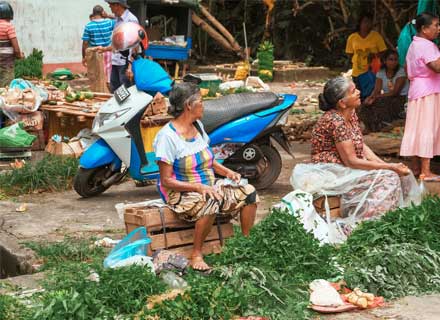Official data revealed that Sri Lanka’s economy contracted by 11.5% in the first three months of 2023, highlighting the country’s ongoing severe financial crisis. According to the Census and Statistics Department, the downturn was primarily driven by high inflation, elevated interest rates, increased component costs, import restrictions, and reduced earnings from apparel exports.
Within the sectors, the agriculture sector experienced a modest growth of 0.8% compared to 2023. In comparison, industries witnessed a significant contraction of 23.4%, and services declined by 5%, as reported by the department.
The central bank of Sri Lanka projects a GDP contraction of 2% for 2023, while the International Monetary Fund (IMF) estimates a more substantial contraction of 3%.
“Sri Lanka’s economy is showing tentative signs of improvement, in part due to the implementation of critical policy actions. But the economic recovery remains challenging. Now, more than ever, it is essential to continue the reform momentum under strong ownership by both the authorities and the Sri Lankan people,” IMF’s Deputy Managing Director Kenji Okamura said, during his two-day visit to the debt-ridden South Asian island nation.
Okamura’s visit came after the IMF’s March 2023, 2023 approval, which ensured 48-Month arrangements of about USD 3 billion under the Extended Fund Facility (EFF) with Sri Lanka. The official also noted that the island nation’s current economic crisis had its genesis in policy missteps aggravated by external shocks.
The first-quarter contraction was slightly higher than anticipated, ranging between 9% and 10%. However, experts, such as Shehan Cooray, the head of research at Acuity Stockbrokers, predict a return to positive growth in the year’s second half.
To stimulate the economy, Sri Lanka’s central bank recently cut its first interest rate in three years, reducing speeds by 250 basis points. Cooray believes that an increase in private-sector credit, expected to occur within the next six to nine months, will positively impact economic growth.
In 2022, Sri Lanka’s economy contracted by a record 7.8%, resulting in a severe financial crisis due to plummeting foreign exchange reserves. The country’s situation began to improve after securing a USD 2.9 billion bailout from the IMF in March 2023, along with enhanced dollar inflows and some reduction in inflation. However, completing debt restructuring talks before September remains crucial for the first IMF review.

